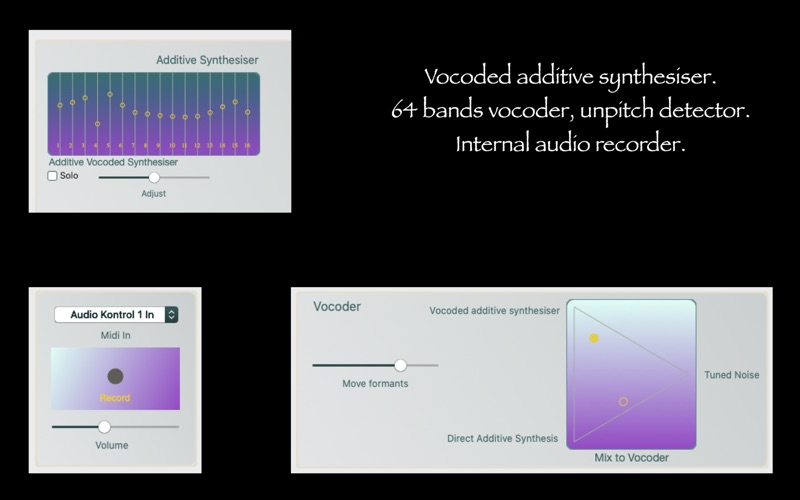VoxUnit - the basics
macOS / Musique
This version of VoxUnit for MacOS is, in a way, a simplified version of this vocoder, but which retains what worked really well in previous versions, including the iOS version of VoxUnit. The MacOS version works well for creating choir effects: if you play several notes on the keyboard while speaking into the microphone, the vocoder gives very correct choir effects.
Vox Unit has to be used as a classical vocoder : you speak in the microphone of your studio and you play some chords on the MIDI keyboard. Then a choir effect will be heard.
The force of your voice is used as a controller : an envelope follower analyses your voice and adds modulation to many parameters of Vox Unit. This helps to humanise the sound of VoxUnit, it is more expressive, and you create more realistic voices effects this way.
Vox Unit uses the clearness of the additive synthesis controlled by the analyser to get a more defined or precise voice effect. Normally, you should be able to hear vowels clearly if you listen to the additive synthesiser in solo mode. This synthesiser is mixed with tuned noise to create the breath effects of the natural voice. An unpitch detector uses a mix of white noise and of the filtered input voice to create the consonants.
The vibrato and the glissando are the most expressive effects of the voice of a singer. So these effects are optimised to make these effects natural. VoxUnit includes also a reverb and a chorus.
The vocoder of Vox Unit has got 64 bands. It makes sound very intelligible.
You need an external MIDI keyboard to use VoxUnit. The software uses the default audio inputs and outputs from the Mac. If you want to use your sound card for example, set the inputs and outputs of your choice in Preferences.
Use headphones to not encounter feedback noises (especially if you're using the Mac's internal microphone).
To address the audio to Logic (or any other software), you have two solutions. You can use an internal audio router - you can also use IAC for MIDI. You can also use the internal recorder to record your performance, and drag and drop the audio file to your host sequencer. For several reasons, there is not a plug-in for VoxUnit : you'll record it as an audio session in your host sequencer.
The application includes presets as demonstration of choir effects, but also as demonstration of unusual voices sounds. The presets you created with the iOS version are compatible with the MacOS version : use the Finder to exchange files between the two devices.
VoxUnit offers you a simple and inexpensive solution to obtain choir and voice effects in your next musical creations: have fun!
Demonstration video on our site. All the choirs of the demo are included to the presets.
Quoi de neuf dans la dernière version ?
Fixed a chorus display issue.
Added an "All notes off" button.




